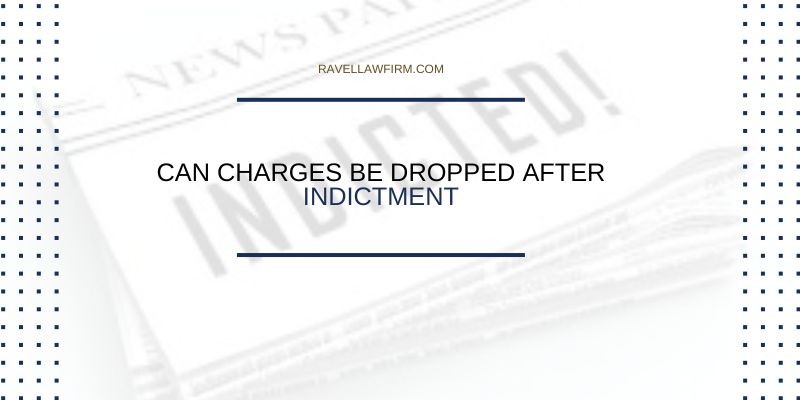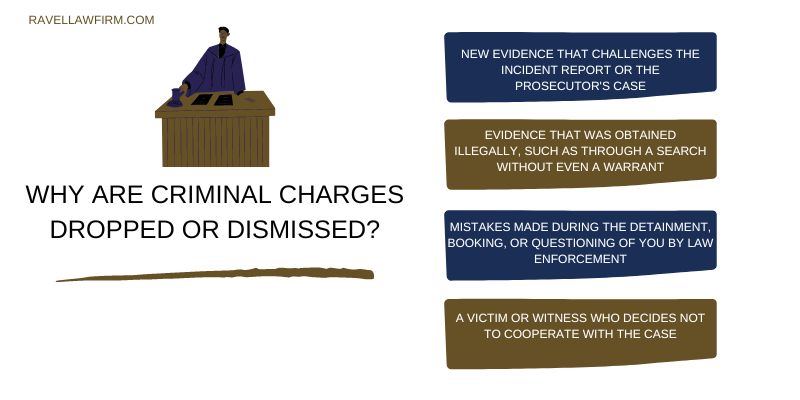If you are facing criminal allegations, you might be curious to know how to drop or dismiss these charges. I’ll first respond to the most asked question, Can charges be dropped after an indictment?
Keep in mind that not all indictments lead to a trial. Many accusations are dropped before a trial through conversations between the prosecutors and defense lawyers. However, only the prosecutor has the power to dismiss these allegations.
This can happen when you are supported by an experienced and knowledgeable criminal defense lawyer. Attorneys are aware of various circumstances that can work against the determination of the case, including lack of sufficient evidence, unreliable witnesses, and inadmissible proof.

What Does a Charge Being Dropped Mean?
A charge can be dropped either before or after a case is filed. In some cases, you may need to ask the prosecution to drop the charge, although a court may also dismiss a charge if there was a serious legal error in the case. It’s important to note that even if the prosecution agrees to drop the charges, they may still reserve the right to re-file charges in the future.
Reasons Why Charges May Be Dropped After Indictment
The prosecution may drop a charge before or after it is submitted to the court. The following reasons could lead to charges being dropped:
- Insufficient evidence: If the prosecutor determines that the evidence against the defendant is lacking, the charges may be dropped. Or perhaps new details come to light that refutes the accusations made by the prosecution against the defendant.
- Fourth Amendment Violations: If evidence was improperly obtained, like without a search warrant, the prosecutor might decide not to press charges. The prosecutor is aware that the evidence won’t be admitted in court if it is gathered in a way that violates the plaintiff’s constitutional rights.
- Procedural Mistakes: Another technicality might result in the dismissal of the charges. When making an arrest, booking a suspect, and holding them in custody until their hearing or trial, police must adhere to specific criminal procedures. These administrative mistakes might be reasons for case dismissal or penalty reduction if a defendant’s rights were infringed.
- Resource Issues: The prosecution, a government employee, can merely handle an excessive number of cases and not enough resources. The worst offenders may need to be dropped.
- Willingness to Cooperate: If prosecutors learn that you are willing to collaborate with law authorities to help uncover similar crimes or cooperate in other instances, they may be convinced by your lawyer to reach a deal to drop your case completely.
In any case, your defense counsel can make a case on your part to drop a charge by referencing these reasons to the prosecutor.
We Are a Expert Family Lawyer In Delaware, Request a Call Back Today!
Why Do Victims Drop Charges?
For various reasons, a victim can decide against testifying against the defendant. These include:
- The criminal may intimidate the victim.
- The victim can love the suspect and want to keep their friendship going. This primarily occurs in circumstances of domestic violence.
- The victim might realize they chose the wrong person.
A victim who modifies their statement can be accused of filing a fraudulent police report. If so, they should look for a criminal defense attorney to stay clear of allegations.
How Often Do Charges Get Dropped?
As explained above, Charges can be dropped for various reasons, from the complete dismissal of all counts (which is less usual) to the partial release of some charges while maintaining others. The key lesson is that orders may be withdrawn for a variety of reasons that span the course of a criminal investigation.
Hiring a knowledgeable criminal defense attorney will help you boost your chances of success with so many possible reasons for charges to be dropped. Attorneys with experience will hold the procedure to the highest standards and ensure that all possibilities are adequately investigated.
Why Should You Get Charges Dropped Before the Date?
You can escape this awful predicament without damaging your reputation, finances, or criminal record if the allegations are dismissed before the court date. You won’t have accrued any fines or jail time.
This is a strategy for separating yourself from your past errors. You won’t be punished for the rest of your life by having a criminal record for something you may not have done wrong. You can learn more about How To Get Charges Dropped Before Court Date.
Having a felony or, in some cases, a misdemeanor on your legal record can result in open discrimination against you in practically all facets of your life. The following are a few of the most typical repercussions of having a long-term criminal record:
- If your employer checks your criminal history, you can lose employment.
- You might have a hard time moving and getting a new job.
- Your security clearances and professional licenses could be revoked.
- You might never be permitted to own a firearm.
- A student loan application may be rejected.
What About Reducing a Charge?
Possibly, the idea of a charge decrease would be interesting to you. This is possible when the evidence does not support a specific charge but may support a prosecution for a lesser offense.
A “plea bargain agreement” could then be presented by the prosecution. That occurs when the defendant enters a guilty or no-contest plea to a lesser charge in return for the prosecution agreeing to abandon the first allegation.
Remember that regardless of whether you reached a plea agreement, the first charges would typically not be dropped or removed from your record; however, if you did not go to trial on the original accusation. The first accusation, though, might be deleted from your criminal background if you challenged it and weren’t found guilty.
See Also: What Happens After Grand Jury Indictment
Can a Misdemeanor Charge be Dropped?
A misdemeanor charge indicates that you have been accused of a relatively minor offense, but this does not necessarily imply that it will not have any lasting effects on your life.
Your record will reflect a misdemeanor charge for the entirety of your life. This implies that you could have a misdemeanor record if someone ran a background investigation on you. They can use this against you to stop you from having a decent job or your place. They may even use this data to reject your loan application.

A minor conviction could also result in additional repercussions. You can be subject to a hefty fine and may have to complete some community service. You can be sentenced to a set probation period, and you may have to serve some time in prison.
Finally, a misdemeanor conviction will follow you for the remainder of your life if you enter a guilty plea or are found guilty by a jury of your peers. If you’ve been accused of a misdemeanor, you have to mount a strong case because it is very difficult to have a conviction expunged from your record.
Why are Criminal Charges Dropped or Dismissed?
Criminal charges might well be dropped or dismissed for a variety of reasons. A prosecutor may decide not to pursue a case involving dropped charges if there is inadequate or conflicting evidence. These are some other justifications for dropping charges.
- New evidence that challenges the incident report or the prosecutor’s case
- Evidence that was obtained illegally, such as through a search without even a warrant
- Mistakes made during the detainment, booking, or questioning of you by law enforcement
- A victim or witness who decides not to cooperate with the case
Many of the same factors, including insufficient evidence, untrustworthy or inaccessible witnesses, or infringement of your constitutional rights, may result in the dismissal of possible offenses.
Before trial, your felony defense counsel might bring up these issues and argue that the prosecution lacked the necessary evidence to convict you of the offense. Your attorney may ask the prosecutor to drop the case or dismiss it.
Getting legal counsel if you are considering any criminal charges is crucial. A criminal defense attorney can assist you in identifying mistakes, violations of human rights, and other circumstances that might result in charges being withdrawn or dismissed.
Also Check How To Convince Prosecutor To Drop Charges
What to Look for when Charges are Dropped?
To ascertain whether a complaint has been dismissed, it is vital to comprehend how the criminal justice system operates. This is so that the prosecutor can choose to drop charges if the grand jury returns a “no bill” for misdemeanors or if the charges pass the jury trial and the prosecutor moves to be dismissed.
They are contacting the criminal department of the court where the allegations were brought, or the attorney appointed to that court or judicial district is the most straightforward approach to learning if charges have been dismissed. Even though this is public knowledge, a dialogue with these people can be done most promptly and effectively with the assistance of qualified lawyers.
Additionally, calling the authorities looking to prosecute you by yourself is not advisable if you are unsure whether your charges have indeed been withdrawn because you risk saying something damaging while merely seeking information. Thus, it is better to hire a lawyer to verify for you to know whether your charges were dropped.
FAQ’s
What is one reason Prosecutors may decide to dismiss cases?
The prosecutor may drop the charges if they are insufficient based on the evidence presented against the defendant. Or perhaps new details come to light that cast doubt on the prosecution’s case against the defendant.
What is the difference between charges being dropped or dismissed?
A crucial difference between the two is that only a judge may dismiss charges. To be qualified for dismissal, the case must also have a formal file against you in court. Cases, however, might be dismissed either before or after a trial.

Hi, I’m Brian Gary; I have my Doctor of Juridical Science (SJD) degree from SMU Dedman School of Law in Dallas. Over the years, I have dealt with many families and successful corporate Legal cases. I have counseled many people on legal matters, and along with my profession, I write about Law on my blog. Please feel free to contact me for counseling/case discussion; I’ll be happy to help you.